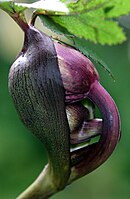
Morphological (and not anatomical or reproductive) features define early vascular plant phylogenetic relationships.
Sign Up to like & getrecommendations! Published in 2020 at "American journal of botany"
DOI: 10.1002/ajb2.1440
Abstract: PREMISE Perhaps the most rapid period of vascular plant evolution occurred during the Silurian-Devonian time interval. Yet, few quantitative analyses have established the extent to which anatomical, morphological, or reproductive features contributed to this episode… read more here.
Keywords: topology; phylogenetic relationships; character states; reproductive features ... See more keywords

Phylogenetic relationships among Bombycinae (Lepidoptera, Bombycoidea, and Bombycidae) based on mitochondrial genomes.
Sign Up to like & getrecommendations! Published in 2022 at "Archives of insect biochemistry and physiology"
DOI: 10.1002/arch.21889
Abstract: The subfamily Bombycinae Latreille, [1802] is an important silk-producing group, including well-known economical insects. Although there are many studies on the development of these economic insects, the relationships between genera/species of this subfamily are still… read more here.
Keywords: bombycinae lepidoptera; insects; relationships among; among bombycinae ... See more keywords

Geographic distributions shape the functional traits in a large mammalian family
Sign Up to like & getrecommendations! Published in 2021 at "Ecology and Evolution"
DOI: 10.1002/ece3.8039
Abstract: Abstract Traits of organisms are shaped by their living environments and also determined in part by their phylogenetic relationships. For example, phylogenetic relationships often affect the geographic distributions of animals and cause variation in their… read more here.
Keywords: shape functional; family; functional traits; phylogenetic relationships ... See more keywords

Strong plastid degradation is consistent within section Chondrophyllae, the most speciose lineage of Gentiana
Sign Up to like & getrecommendations! Published in 2022 at "Ecology and Evolution"
DOI: 10.1002/ece3.9205
Abstract: Abstract Recovering phylogenetic relationships in lineages experiencing intense diversification has always been a persistent challenge in evolutionary studies, including in Gentiana section Chondrophyllae sensu lato (s.l.). Indeed, this subcosmopolitan taxon encompasses more than 180 mostly… read more here.
Keywords: section chondrophyllae; section; phylogenetic relationships; degradation ... See more keywords

Mitochondrial genome architecture and phylogenetic relationships of Odontesthes argentinensis within Atherinomorpha.
Sign Up to like & getrecommendations! Published in 2021 at "Genetica"
DOI: 10.1007/s10709-021-00116-8
Abstract: Silversides are a widely distributed group across South America, with several species occupying marine, freshwater and estuarine environments. Several authors suggest main transitions among these environments took place during Pleistocene, and were accompanied with rapid… read more here.
Keywords: architecture phylogenetic; argentinensis; phylogenetic relationships; mitochondrial genome ... See more keywords

Description and phylogenetic relationships of a new genus of sea cucumbers from Australia, with two new combinations (Holothuroidea, Stichopodidae)
Sign Up to like & getrecommendations! Published in 2019 at "Marine Biodiversity"
DOI: 10.1007/s12526-019-00974-8
Abstract: A new genus of Holothuroidea, Notostichopus, from Australia is described and its phylogenetic relationship examined. The new genus is based on two species within the family Stichopodidae, previously attributed to Stichopus. Notostichopus is characterized by… read more here.
Keywords: new genus; relationships new; description phylogenetic; phylogenetic relationships ... See more keywords

Phylogenetic relationships and regional spread of meningococcal strains in the meningitis belt, 2011–2016
Sign Up to like & getrecommendations! Published in 2019 at "EBioMedicine"
DOI: 10.1016/j.ebiom.2019.02.054
Abstract: Background Historically, the major cause of meningococcal epidemics in the meningitis belt of sub-Saharan Africa has been Neisseria meningitidis serogroup A (NmA), but the incidence has been substantially reduced since the introduction of a serogroup… read more here.
Keywords: whole genome; belt; 2011 2016; phylogenetic relationships ... See more keywords

Phylogenetic relationships of Chlamydomyces, Harzia, Olpitrichum, and their sexual allies, Melanospora and Sphaerodes.
Sign Up to like & getrecommendations! Published in 2017 at "Fungal biology"
DOI: 10.1016/j.funbio.2017.07.004
Abstract: Phylogenetic analyses using internal transcribed spacer (ITS), large subunit rRNA (LSU), and small subunit (SSU) sequence data showed that Harzia, Chlamydomyces, and Olpitrichum are con-generic. Thus, Chlamydomyces, and Olpitrichum were reduced to synonymy of Harzia.… read more here.
Keywords: melanospora sphaerodes; olpitrichum sexual; harzia olpitrichum; relationships chlamydomyces ... See more keywords

Plastome Evolution and Phylogenetic Relationships Among Malvaceae Subfamilies.
Sign Up to like & getrecommendations! Published in 2020 at "Gene"
DOI: 10.1016/j.gene.2020.145103
Abstract: Malvaceae s.l. is the largest family of Malvales, comprising more than 4225 species. Within Malvaceae, the phylogenetic relationships among subfamilies remain controversial. To resolve these relationships and explore plastome evolution in Malvaceae, we assembled a… read more here.
Keywords: plastome evolution; relationships among; phylogenetic relationships; malvaceae subfamilies ... See more keywords

The complete mitochondrial genome of Bactrocera biguttula (Bezzi) (Diptera: Tephritidae) and phylogenetic relationships with other Dacini.
Sign Up to like & getrecommendations! Published in 2019 at "International journal of biological macromolecules"
DOI: 10.1016/j.ijbiomac.2018.12.186
Abstract: Bactrocera biguttula is an African olive fruit fly that does not attack cultivated olives but rather develops in the fruits of wild species of Olea and Noronhia. The complete mitochondrial genome of an individual specimen… read more here.
Keywords: complete mitochondrial; bactrocera; phylogenetic relationships; bactrocera biguttula ... See more keywords

Phylogenetic relationships and historical population reconstruction of Asian members of the genus Epischura (Copepoda, Calanoida)
Sign Up to like & getrecommendations! Published in 2020 at "Journal of Great Lakes Research"
DOI: 10.1016/j.jglr.2019.10.008
Abstract: Abstract We have reconstructed major demographic and phylogenetic events for two closely related copepod species: Epischura baikalensis Sars, 1900 (Copepoda, Calanoida), a key endemic species of the plankton community from Lake Baikal, and E. chankensis… read more here.
Keywords: copepoda calanoida; relationships historical; phylogenetic relationships; population ... See more keywords